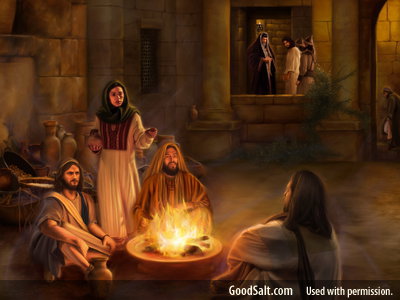“7 Now when the thousand years have expired, Satan will be released from his prison 8 and will go out to deceive the nations which are in the four corners of the earth, Gog and Magog, to gather them together to battle, whose number is as the sand of the sea.” Revelation 20:7-8
The Bible makes it clear that King Jesus’ kingdom will last forever: 1 The prophet Isaiah predicts, “Of the increase of His government and peace there will be no end, upon the throne of David and over His kingdom, to order it and establish it with judgment and justice from that time forward, even forever.” (Isaiah 9:7). The angel Gabriel announced Isaiah’s prophecy to the Virgin Mary concerning her Son, “32 He will be great, and will be called the Son of the Highest; and the Lord God will give Him the throne of His father David. 33 And He will reign over the house of Jacob forever, and of His kingdom there will be no end.” (Luke 1:32-33). Loud voices in heaven declared, “The kingdom of this world has become the kingdom of our Lord and of His Christ, and He shall reign forever and ever!” (Revelation 11:15). According to the prophet Daniel, the saints of the Most High God will possess this kingdom forever, “But the saints of the Most High shall receive the kingdom, and possess the kingdom forever, even forever and ever.” (Daniel 7:18).
If Christ’s Kingdom is eternal and His saints possess it forever and ever, how can Revelation 20 say it only lasts “a thousand years” (20:1-7)? Because the Millennial Kingdom of Christ is only the first thousand years of King Jesus’ eternal reign. The peace and righteousness established by King Jesus during the first thousand years will continue forever without end. King Jesus and His faithful followers will never be dethroned. Satan and his false messiah (the beast) will never regain their thrones. The world will never again be ruled by Satan and his followers. 2 But Satan does not accept defeat easily. He is so full of deceit and pride that he convinces himself he can still overcome King Jesus at the end of Christ’s first thousand-years of His eternal reign.
“7 Now when the thousand years have expired, Satan will be released from his prison 8 and will go out to deceive the nations which are in the four corners of the earth, Gog and Magog, to gather them together to battle, whose number is as the sand of the sea.” (Revelation 20:7-8). John informs us that “when the thousand years have expired, Satan will be released from his prison” in the bottomless pit or Abyss. The Devil will resume his strategy of deception and “will go out to deceive the nations which are in the four corners of the earth” (i.e., all over the earth). 3 Satan’s plan is to “deceive” all nonbelievers represented by the words “Gog and Magog,” and “gather them together to battle” against King Jesus and His people in the city of Jerusalem (“beloved city” – 20:9; cf. Ezekiel 38:11-12). Ezekiel 38-39 informs us that “Gog” (cf. 38:2-3) will be the earthly military leader over this huge army of unbelieving people that Satan will deceive. “Magog” represents the land or nations that Gog is from (Ezekiel 38:2). 4 Here the terms are symbolic of all the enemies of God in general. 5
Even though King Jesus has been reigning perfectly in righteousness for “a thousand years,” the number of nonbelievers who rebel against Christ will “number as the sand of the sea.” 6
“These people will be like people in the first century AD who followed Jesus and applauded His miracles but then yelled, ‘Crucify Him’ before Pilate (Luke 23:21). Such people will follow Jesus outwardly but have experienced no heart transformation. When Satan is released from captivity, he will not force anyone to rebel against Christ. He simply will take advantage of what’s already inside them.” 7
Who are those who follow Satan’s rebellion against King Jesus? If Christ judges all the nonbelievers left on earth after Armageddon at the Judgment of the Sheep and Goats, consigning them to the lake of fire in Matthew 25:31-46, where do the unsaved people with non-glorified bodies come from? Most likely they will come from two different groups:
1. Some will be the infants and children of the unsaved who survived Armageddon and were not confined to the lake of fire (Matthew 25:41) along with their parents because they were below the age of accountability. They enter the Millennium in natural human bodies and eventually will marry and bear children throughout the thousand-year reign of Christ (Isaiah 65:18-25). 8
2. Some will be the offspring of believers who survived the Tribulation and will enter the Millennium in their mortal bodies, able to bear children and repopulate the earth (Isaiah 65:18-25). 9
By the end of the thousand years, the world will be filled with numerous generations of descendants from both groups of Tribulation survivors many of whom believed in King Jesus and have eternal life while many others did not believe in King Jesus and will be vulnerable to Satan’s deception.
Why is Satan permitted to lead one final worldwide rebellion against the Lord? One reason is to demonstrate the incorrigibility of Satan. After one thousand years of imprisonment, the Devil had not changed for the better nor been reformed. The second reason is to demonstrate the depravity or wickedness of humanity. 10 Wiersbe writes, “As final proof that the heart of man is desperately wicked and can be changed only by God’s grace [cf. Jeremiah 17:9]. Imagine the tragedy of this revolt: people who have been living in a perfect environment, under the perfect government of God’s Son, will finally admit the truth [that they hate Him] and rebel against the King!…
“In one sense, the millennial kingdom will ‘sum up’ all that God has said about the heart of man during the various periods of history [dispensations]. It will be a reign of law, and yet law will not change man’s sinful heart. Man will still revolt against God [cf. Genesis 2:16-17]. The Millennium will be a period of peace and perfect environment, a time when disobedience will be judged swiftly and with justice; and yet in the end the subjects of the King will follow Satan and rebel against the Lord. A perfect environment cannot produce a perfect heart.“ 11
Next the apostle John writes, “They went up on the breadth of the earth and surrounded the camp of the saints and the beloved city. And fire came down from God out of heaven and devoured them.” (Revelation 20:9). This massive army of unsaved people are deceived by Satan into believing that victory over King Jesus and His people is possible. During the thousand-year rule of Christ, many people will outwardly conform to Christ’s rulership, but inwardly their hearts will be hardened so that when Satan is released, they will harbor bitter feelings that will be ripe for the Devil’s message of false hope. 12 So, Satan and his massive army go “up on the breadth of the earth” (i.e., “the broad plain” of Palestine) 13 and surround “the camp of the saints and the beloved city” of Jerusalem from which King Jesus and His faithful followers ruled the earth.
The war that Satan masterfully planned never took place. Before a single shot is fired or blasphemous words are uttered, “fire” quickly “came down from God out of heaven and devoured” Satan’s huge army of rebels. 14

Following the destruction of Satan’s followers, “the devil, who deceived them, was cast into the lake of fire and brimstone where the beast and the false prophet are. And they will be tormented day and night forever and ever.” (Revelation 20:10). The fact that “the beast and the false prophet are” still there a thousand years later (19:20) demonstrates that this is a place of conscious torment, not annihilation. 15 The lake of fire is a place of eternal punishment as indicated by the statement, “they will be tormented day and night forever and ever.” The “they” refers to the unholy trinity of the “devil… the beast and the false prophet.” When Satan was the heavenly angel named Lucifer (Isaiah 14:12; Ezekiel 28:11-15a), he could have remained loyal to God and avoided this horrific, eternal destiny. “But he chose his way over his Creator’s, which is always in every situation, a foolish and costly decision.” 16
It is important to understand that the judgment experienced by individuals in the lake of fire will not be identical. Instead, the judgment a person or demon receives will be in proportion to their sinful works (cf. 20:12-13). 17 In this case, “the devil” is “cast” straight “into” the same portion of the lake of fire as “the beast and the false prophet.” This unholy trinity will receive the worst punishment for their heinous sins which deceived multitudes of people to rebel against God and His promised Messiah, Jesus Christ.
Jesus taught that “the everlasting fire” was “prepared for the devil and his angels” (Matthew 25:41). It was not prepared for people. The only way people can go to the lake of fire is by choosing the way of Satan. No one goes to hell by accident. 18 Those who refuse to believe in Jesus Christ for His gift of eternal life are sending themselves to the lake of fire. God does not send them there. They send themselves there. When a person refuses to trust Christ alone for the free gift of eternal life, they are in essence saying to God, “I reject what Jesus Christ did in my place as my Substitute.” Therefore, God has no choice but to let us pay for our own sin, through eternal separation from Him in what the Bible calls hell or the lake of fire. Those who go to hell are going there of their own choosing because they have rejected Christ and His free offer. God has not rejected them; instead, they have rejected God.
Suppose God blessed you and your spouse with a little boy. You love that little boy so much that you’d do anything for him. Forbid the thought, but suppose that when your little boy is 21, he begins a wayward life and eventually murders someone. Your state sentences him to die by lethal injection. Suppose that you could walk into his cell the morning he is to be executed and offer to take his place. That’s how great your love is for him. In so doing, you explain that he can be a free and forgiven man. Much to your surprise, he pushes you aside, walks to the table, and receives the punishment for his horrible crime himself. Did you not love him enough? Would you accept the accusation, “If you really loved your son, you wouldn’t have allowed that to happen”? Hardly! You did not reject him; he rejected you.
Many of us are grieving the tragic school shooting at Uvalde, Texas yesterday (May 24, 2022). This senseless killing of nineteen fourth grade students and two teachers has sent a shockwave across our nation. Amid the sadness, politicians are already using this tragic shooting to boost their views on gun control, as if governmental laws will prevent such tragedies from happening in the future.
Before people will change their behaviors, they must undergo a change of heart. Governments do not change the human heart. Revelation 20:7-10 demonstrates this. Satan was bound for a thousand years, unable to deceive the nations (20:1-3) and King Jesus provided a perfect government to guide the people (20:4-6; cf. Psalm 2:6-9). Much of the world’s temptations were removed. Yet when given the opportunity at the end of the thousand years, unsaved people still rebelled against their good and gracious King (20:7-9). Why? Because the human heart is deceived and desperately wicked (Jeremiah 17:9).
The world is not getting better. The tragic Uvalde school shooting reminds us of this. You can legislate all the laws you want, but until this country gets God back into human hearts, the brokenness of our society will worsen. It does not help to blame the devil (I Peter 5:8) or the world (I John 2:15-16) alone for all this mess. The depravity of humankind is also responsible (Jeremiah 17:9; Romans 3:9-23).
Only Jesus Christ can cleanse a desperately wicked heart and make lasting and healthy changes within a person. Christ said, “I am the bread of life. He who comes to Me shall never hunger, and he who believes in Me shall never thirst.” (John 6:35). Jesus says to look to Him (not to government, pleasure, possessions, or power) to satisfy our hunger for immortality. Look to Him to quench our thirst for eternal life. What do you do when you are hungry? You eat. What do you do when you are thirsty? You drink. Jesus says that if we come to Him in faith, we will never hunger for eternal life again. If we believe in Him, we will never thirst for eternal life again.
The moment we come to Jesus in faith, He makes us a new person inside. The Bible says, “Therefore, if anyone is in Christ, he is a new creation; old things have passed away; behold, all things have become new.” (2 Corinthians 5:17). When you are “in Christ” by believing in Jesus for His gift of eternal life, He gives you a new identity, and the past is gone. You’ve got potential because Jesus now lives in you through His Holy Spirit (Romans 8:10-11; Galatians 2:20)!!!!
Prayer: Heavenly Father, thank You for exposing the sinfulness of our hearts by revealing what happens at the end of the Millennium when Satan is released and leads a final worldwide rebellion against the King of kings and Lord of lords only to be crushed by the Lord. The thousand-year reign of Christ sums up the total depravity of humankind. Despite a thousand years of peace and perfect government led by a perfect King Who judges disobedience swiftly and with justice, in the end people will still follow Satan and rebel against the Lord God. This proves that apart from the transforming grace of God, people are rebels to the very end, even after living a thousand years under a perfect government and a perfect King. Oh Father God, we need You to change our wicked hearts. As the songs says, “Change my heart Oh God, make it ever true. Change my heart Oh God, may I be like You.” In the matchless name of Jesus Christ, we pray. Amen.
ENDNOTES:
1. Charles Swindoll, Insights on Revelation (Swindoll’s Living Insights New Testament Commentary Book 15, Tyndale House Publishers, Inc., 2014 Kindle Edition), pg. 359.
2. Ibid., pp. 359-360.
3. Bob Vacendak; Robert Wilkin; J. Bond; Gary Derickson; Brad Doskocil; Zane Hodges; Dwight Hunt; Shawn Leach; The Grace New Testament Commentary: Revised Edition (Grace Evangelical Society, Kindle Edition, 2019), pg. 1580.
4. Ibid.
5. Tony Evans, CSB Bible by Holman, The Tony Evans Study Commentary (B & H Publishing Group, Kindle Edition 2019), pg. 2418.
6. Vacendak, pg. 1580.
7. Evans, pg. 2418.
8. Vacendak, pg. 1580.
9. Swindoll, pg. 360; cf. John F. Walvoord, The Bible Knowledge Commentary Epistles and Prophecy, Editors John F. Walvoord and Roy B. Zuck (David C. Cook, 2018 Kindle Edition), location 6423.
10. Tom Constable, Notes on Revelation, 2017 Edition, pg. 226.
11. Ibid., pg. 227 cites Warren W. Wiersbe, The Bible Exposition Commentary, Vol. 2 (Wheaton: Victor Books, Scripture Press, 1989), pg. 620.
12. Swindoll, pg. 361.
13. Constable, pg. 228.
14. Swindoll, pg. 360.
15. Constable, pp. 228-229 cites David E. Aune, Revelation 17-22 Word Biblical Commentary series (Nashville: Thomas Nelson, 1998), pg. 1100; cf. Walvoord, location 6444.
16. Vacendak, pg. 1580.
17. Evans, pg. 2419. 18. Ibid.




